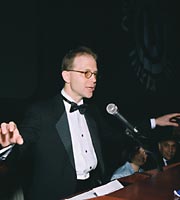Signs of an Emerging Policy, Part II: Food for Rights
The question I’ve been asking this week is why the world should bother giving North Korea food aid when the North insists that the donors have no right to monitor it, meaning that it all ends up in the bellies of the elite. In North Korea, even the enlisted soldiers are starving, and Marcus Noland has reminded us that North Korea has taken advantage of food aid to cut back on food imports and buy more arms. Seventeen percent of North Koreans (may still) live in “closed counties,” where food aid workers have never even been permitted to enter. Ronald Reagan was right when he said that a hungry child knows no politics, but throwing food around is of no use if it won’t feed the hungry child.
 The Chosun Ilbo reports that the new Special Envoy for Human Rights in North Korea, Jay Lefkowitz (bio), agrees that our aid policy has lacked some necessary conditions and is now publicly suggesting linking aid to human rights improvements. With fresh backing from Secretary of State Condoleezza Rice, he’s not waiting for a quiet diplomatic interlude to express this view:
The Chosun Ilbo reports that the new Special Envoy for Human Rights in North Korea, Jay Lefkowitz (bio), agrees that our aid policy has lacked some necessary conditions and is now publicly suggesting linking aid to human rights improvements. With fresh backing from Secretary of State Condoleezza Rice, he’s not waiting for a quiet diplomatic interlude to express this view:
Asked at his maiden meeting with reporters at the State Department if the two should be linked, Lefkowitz said, “North Korea is clearly a significant recipient of international aid, point No. 1. Point No. 2: there’s no question that we want to see progress in terms of their human rights record. And No. 3, I think consistent with what the president’s overall approach is to human rights and to bringing, ideally, North Korea into the community of nations, we have to take a look at all different areas of our relationship with North Korea.”
The U.S. has so far provided food aid unconditionally. Lefkowitz, whose post was created under the North Korea Human Rights Act that went in effect in October, has duties that involve him in all facets of U.S. policy toward North Korea. He took office two days ago.
He’s also begun the conversation that we should have started with South Korean society years ago:
The envoy described his duties as “morally unambiguous” and stressed the plight of North Korea’s 20 million people was intolerable. He said the human rights issue was black and white and vowed to discuss the matter in clear terms. He also urged Seoul and the South Korean people to become “core partners” in U.S. efforts to improve the impoverished country’s human rights record.
My only minor tweak to this would be that the human right that’s most urgently needed in North Korea today is the right not to be starved. I yield to no one on the importance of free speech, thought, expression, and yes, votes, but initially it should suffice that we insist on complete transparency in distributing our aid to those who need it most. By meeting the urgent priority of sustaining life everywhere it’s in danger, we will make a substantial step in opening up North Korea’s society, exposing its abuses to the world, and exposing its bankruptcy to its own subjects.
1 Response